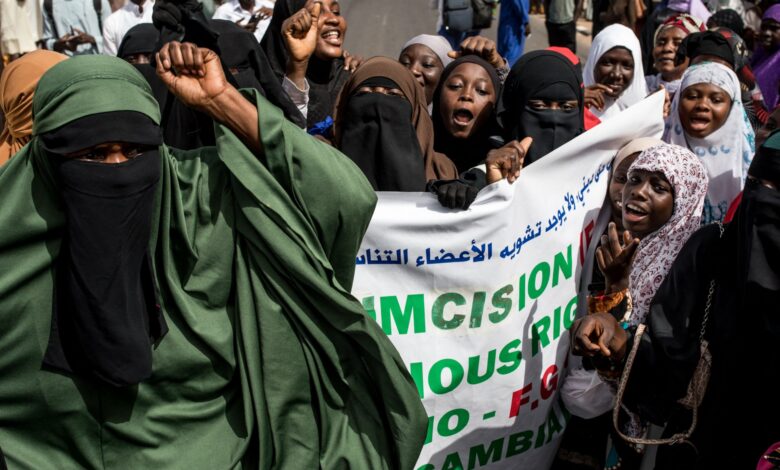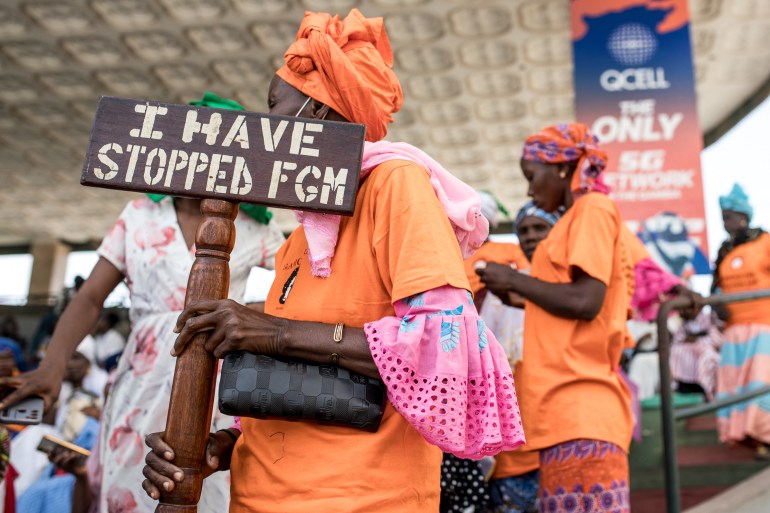The Gambia votes to reverse landmark ban on female genital mutilation

Rights groups say proposed rollback of 2015 law will overturn women’s rights across the region as a whole.
The Gambia has taken steps towards lifting a ban on female circumcision, a move that could make it the first country in the world to reverse legal protections against the practice for millions of women and girls.
Politicians in the West African nation’s parliament voted 42 to four on Monday to advance the controversial bill, which would repeal a landmark 2015 ban on female genital mutilation (FGM) that made the practice punishable by up to three years in prison
Almameh Gibba, the legislator who introduced the bill, argued that the ban violated citizens’ rights to “practice their culture and religion” in the overwhelmingly Muslim country. “The bill seeks to uphold religious loyalty and safeguard cultural norms and values,” he said.
But activists and rights organisations say the proposed legislation reverses years of progress and risks damaging the country’s human rights record.

Jaha Marie Dukureh, of Safe Hands for Girls, an NGO seeking to end FGM, told Al Jazeera that the practice was “child abuse”. She, herself, underwent the practice and watched her sister bleed to death following the procedure.
“The people who applaud FGM in this country, a lot of them are men. These are men who don’t have the same lived experiences that we do, and women who have been through this practice continue to tell them every single day what their suffering is, what their pain is,” she said.
The debate over repealing the ban, imposed by former Gambian President Yahya Jammeh, who ruled the country with an iron fist for 22 years before being toppled in 2016, has divided the nation.
The debate flared up in August, when three women were fined for carrying out FGM on eight infant girls, becoming the first people convicted under the law.
The bill will now be sent to a parliamentary committee for further scrutiny before a third reading, a process that is expected to take three months. The committee can make amendments to the measure.
Health risks
UNICEF, the UN agency for children, defines FGM as “the partial or total removal of the female external genitalia or other injury to the female genital organs for non-medical reasons”.
Seventy-six percent of Gambian females aged between 15 and 49 have undergone FGM, according to a 2021 report by UNICEF.
It can lead to serious health problems, including infections, bleeding, infertility and complications in childbirth, and impairs sexual pleasure.
“Girls’ bodies are their own. FGM robs them of autonomy over their bodies and causes irreversible harm,” said the UN’s The Gambia office on X ahead of the debate.
#FGM is a harmful practice that violates women and girls’ #HumanRights.
We remain committed to supporting🇬🇲 efforts in upholding & protecting the rights and dignity of all citizens, including #Women and #Girls.
Read the UN statement on the proposed Women’s Amendment Bill ⤵ pic.twitter.com/JNNMYjKCVJ
— UN The Gambia (@UNGambia) February 23, 2024
The number of women and girls who have undergone FGM worldwide has increased to 230 million from 200 million eight years ago, UNICEF reported this month.
It said the largest share of those women and girls were found in African countries, with more than 144 million cases, followed by more than 80 million in Asia and the number surpassing six million in the Middle East.
Rights groups believe that The Gambia’s move will set a dangerous precedent for women’s rights.
“There’s the inherent risk that this is just the first step and it could lead to the rollback of other rights such as the law on child marriage … and not just in The Gambia but in the region as a whole,” said Divya Srinivasan, from women’s rights NGO Equality Now.
Criminalisation was a crucial step in the fight against female circumcision, Equality Now said, but noted that more than half of the 92 countries where FGM is practised have laws banning it.
Source
:
Al Jazeera and news agencies



